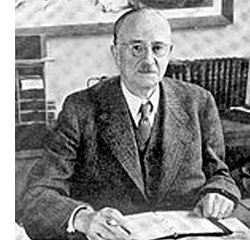Escher award

Prof. dr. B.G. Escher
The Escher Prize, established in 1994, is named after the Leiden Professor of General Geology, Prof. Dr. B.G. Escher (1885-1967).
Click here for more biographical details.
The prize can be awarded annually to the author(s) of the thesis assessed by the Jury as the best thesis in (applied) earth sciences in the broadest sense of the word.
If you think you are eligible for the prize or you are supervising a student whose thesis is above average, please send the thesis to the KNGMG secretariat, stating ‘Escher Prize’. The jury of the Escher Prize consists of earth scientists from the business community, (semi-)government and/or the academic world. A thesis (in Dutch or English) must be submitted digitally (as a Word or PDF file) to the KNGMG secretariat. The submission must also include a brief introduction from the thesis supervisor, correspondence contact details and email address. In addition to an amount of 2,500 euros, the winner will receive a certificate, a year’s membership of the KNGMG and an invitation to publish in The Netherlands Journal of Geosciences. The prize money for the Escher Prize is made available by TNO. An annual call for submission of theses is made in the Geo.brief.
Submissions for the 2022-2023 academic year can be submitted until December 1, 2023.
Winners of the Escher award
1994 — Meindert Schaap, Universiteit Utrecht
1997 — Karin Schalkwijk, Universiteit Utrecht
1998 — Boris van Breukelen, Vrije Universiteit Amsterdam
1999 — Rink Wierd Kruk, Vrije Universiteit Amsterdam
2000 — Rene Jonk en Hendrik Braaksma, Vrije Universiteit Amsterdam
2001 — Vincent van Hinsberg, Universiteit Utrecht
2002 — Douwe van der Meer, Universiteit Utrecht
2003 — I. Folmer, Universiteit Utrecht
2004 — Joost van Summeren, Universiteit Utrecht
2005 — Femke Davids, Universiteit Utrecht
2007 — Hans de Moel, Vrije Universiteit Amsterdam
2008 — Romée Kars, Universiteit Utrecht en TU Delft
2009 — Desirée Roerdink, Universiteit Utrecht
2010 — Eric Fulmer en Thomas Kruijer, Vrije Universiteit Amsterdam
2011 — Inge van Gelder en Luuk Kleipool, Vrije Universiteit Amsterdam
2012 — Annique van der Boon, Universiteit Utrecht
2013 — Lydian Boschman, Universiteit Utrecht
2014 — Ellen van der Veer, Universiteit Utrecht
2015 — Frederique Kirkels, Universiteit van Amsterdam
2016 — Pim Kaskes, Vrije Universiteit Amsterdam
2017 — Laura Coumou, Universiteit Utrecht
2018 — Joëlle Kubeneck, Universiteit Utrecht
2018 — Melanie During, Vrije Universiteit Amsterdam
2019 — Lonneke Roelofs, Universiteit Utrecht
2020 — Sarah de Bie, Vrije Universiteit Amsterdam
2021 — Ashok Dahal, Universiteit Twente
2022 — Eise Nota, Universiteit Utrecht
Escher award regulations
- The Royal Dutch Geological Mining Society (KNGMG) can annually award the Escher Prize to encourage graduating students from a Master’s degree program in Earth Sciences to conduct innovative and thorough research and to provide solid reporting
- The prize is awarded to the author or authors of the best-assessed earth science Master’s thesis of that year (academic year, from September to August).
- The jury of the Escher award consists of a varied group of earth scientists, from academia, business, semi-governmental or government. Jury membership is limited to a term of up to four years. Jury members are appointed by the KNGMG board. Jury members preferably have a doctoral degree or have a strong affinity with research.
- In addition to a cash prize, the winner will receive a one-year membership in the KNGMG and an invitation to publish in The Netherlands Journal of Geosciences.
- Each submission must be made by the author(s) of the thesis, or by the direct research supervisor. The jury reserves the right to request further information regarding the submitted work from the research supervisor.
- The thesis (in Dutch or English) should be submitted digitally (as a pdf file) to the KNGMG secretariat. The submission should also include a short introduction by the thesis supervisor (also as a pdf file), correspondence contact details and e-mail addresses of supervisor and author. As these are often large files it is advisable to contact the KNGMG secretariat first for advice on how best to do this.
- Theses must have been completed at a Dutch institution of scientific education and should have a clear earth science character. A thesis may be fundamental, applied or interdisciplinary in nature.
- For a fundamental subject, originality and hypothesis formation are the most important criteria.
- For an applied topic, the jury looks primarily at its innovative and problem-solving nature.
- For topics based on an interdisciplinary approach, particular attention is paid to the formulated innovative ideas resulting from this approach.
- Theses should include a standard structure with title page, table of contents, abstract, introduction, methods, results, discussion, conclusion, references, appendices, etc. Theses in the form of a manuscript for publication will not be accepted.
- The presentation of the prize will take place at a meeting of the KNGMG or one of its sister-organisations (‘kringen’), or at an earth science related event, this in consultation between the jury, the KNGMG board and the prize winner.
- Send nominations to the secretary of the KNGMG.
Top picture © Earthfocus by Jeroen Peters copyright
